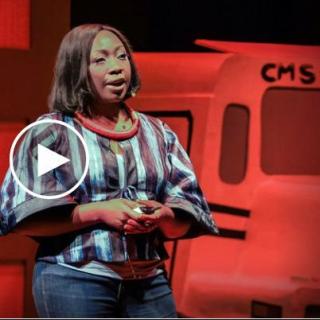
介绍:
0:12
I want to tell you a story about a girl. But I can't tell you her real name. So let's just call her Hadiza.
0:20
Hadiza is 20. She's shy, but she has a beautiful smile that lights up her face. But she's in constant pain. And she will likely be on medication for the rest of her life.
0:36
Do you want to know why? Hadiza is a Chibok girl, and on April 14, 2014, she was kidnapped by Boko Haram terrorists. She managed to escape, though, by jumping off the truck that was carrying the girls. But when she landed, she broke both her legs, and she had to crawl on her tummy to hide in the bushes. She told me she was terrified that Boko Haram would come back for her. She was one of 57 girls who would escape by jumping off trucks that day.
1:09
This story, quite rightly, caused ripples around the world. People like Michelle Obama, Malala and others lent their voices in protest, and at about the same time — I was living in London at the time — I was sent from London to Abuja to cover the World Economic Forum that Nigeria was hosting for the first time. But when we arrived, it was clear that there was only one story in town. We put the government under pressure. We asked tough questions about what they were doing to bring these girls back. Understandably, they weren't too happy with our line of questioning, and let's just say we received our fair share of "alternative facts."
1:49
(Laughter)
1:52
Influential Nigerians were telling us at the time that we were naïve, we didn't understand the political situation in Nigeria. But they also told us that the story of the Chibok girls was a hoax. Sadly, this hoax narrative has persisted, and there are still people in Nigeria today who believe that the Chibok girls were never kidnapped. Yet I was talking to people like these — devastated parents, who told us that on the day Boko Haram kidnapped their daughters, they ran into the Sambisa Forest after the trucks carrying their daughters. They were armed with machetes, but they were forced to turn back because Boko Haram had guns.
2:38
For two years, inevitably, the news agenda moved on, and for two years, we didn't hear much about the Chibok girls. Everyone presumed they were dead. But in April last year, I was able to obtain this video. This is a still from the video that Boko Haram filmed as a proof of life, and through a source, I obtained this video. But before I could publish it, I had to travel to the northeast of Nigeria to talk to the parents, to verify it. I didn't have to wait too long for confirmation. One of the mothers, when she watched the video, told me that if she could have reached into the laptop and pulled our her child from the laptop, she would have done so. For those of you who are parents, like myself, in the audience, you can only imagine the anguish that that mother felt.
3:36
This video would go on to kick-start negotiation talks with Boko Haram. And a Nigerian senator told me that because of this video they entered into those talks, because they had long presumed that the Chibok girls were dead. Twenty-one girls were freed in October last year. Sadly, nearly 200 of them still remain missing.
4:02
I must confess that I have not been a dispassionate observer covering this story. I am furious when I think about the wasted opportunities to rescue these girls. I am furious when I think about what the parents have told me, that if these were daughters of the rich and the powerful, they would have been found much earlier. And I am furious that the hoax narrative, I firmly believe, caused a delay; it was part of the reason for the delay in their return.
4:37
This illustrates to me the deadly danger of fake news. So what can we do about it? There are some very smart people, smart engineers at Google and Facebook, who are trying to use technology to stop the spread of fake news. But beyond that, I think everybody here — you and I — we have a role to play in that. We are the ones who share the content. We are the ones who share the stories online. In this day and age, we're all publishers, and we have responsibility.
5:12
In my job as a journalist, I check, I verify. I trust my gut, but I ask tough questions. Why is this person telling me this story? What do they have to gain by sharing this information? Do they have a hidden agenda? I really believe that we must all start to ask tougher questions of information that we discover online.
5:40
Research shows that some of us don't even read beyond headlines before we share stories. Who here has done that? I know I have. But what if we stopped taking information that we discover at face value? What if we stop to think about the consequence of the information that we pass on and its potential to incite violence or hatred? What if we stop to think about the real-life consequences of the information that we share?
6:19
Thank you very much for listening.
6:20
(Applause)
上一期: Curtis "Wall Street" Carroll: How I learned to read -- and trade stocks -- in prison
下一期: Siddhartha Roy: Science in service to the public good
下一期: Siddhartha Roy: Science in service to the public good
大家还在听

